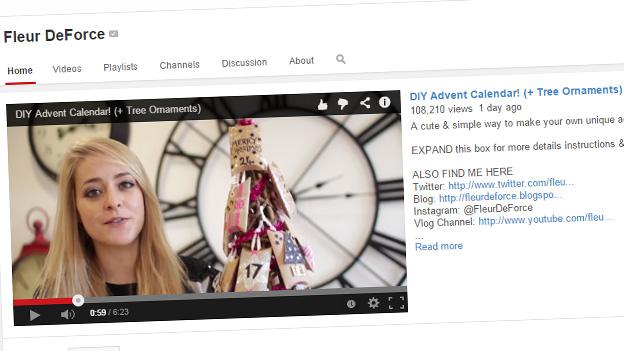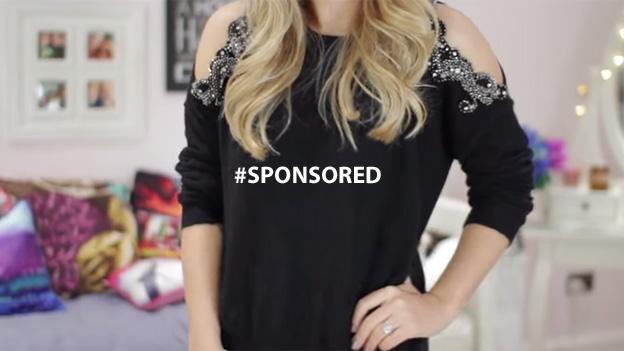YouTubers hit back at advert guidance
- Published
Two of Britain's biggest YouTube stars tell Newsbeat they're worried about new guidance for adverts in their videos.
The Advertising Standards Authority (ASA) says it should be made more obvious, before viewers click play, that clips contain promoted products.
The regulator wants to see warnings - like "ad" or "sponsored" - in the video's title or a symbol in the thumbnail.
But Ebony Day and Fleur DeForce think that would be a step too far.

Fleur de Force has more than one million YouTube subscribers. Lots of her videos are about products and shopping.
She told Newsbeat it's important to be open about sponsorship but thinks putting that information in top section of the info bar is enough.
"I've been very vocal about disclosing sponsored content and it does need to be regulated," she explained.
But she reckons highlighting the fact a video is sponsored in the title would "distract from the content and send out a bigger message than it needs to".
"If you're producing a 30 second piece of sponsored content within a 10 or 15 minute video it's not necessarily the focus of the content," she said.
"It almost ruins the content from a creative point of view."
She added: "It does need to be clear but we need to work out a better way than putting it in the title."
Fleur compared vlogging to "advertorials" in magazines where it doesn't specifically say "advert" in the title.

Would labels on videos "distract from the content"? Fleur reckons so. We mocked up what it could look like.
Meanwhile, Ebony Day, who has around 300,000 followers, told Newsbeat: "The word 'advert' on YouTube makes it feel less genuine, you'd hope the person doing it actually likes the product. I probably wouldn't watch it, I'd expect the whole thing to be an advert".
She thinks it's different to when TV programmes use a logo to let viewers know there is product placement.
"On TV I feel like it's expected but when it comes to YouTube it's not a big company, it's an individual in their bedroom."
So why is it suddenly a big talking point?
The new advice comes after the ASA decided some of Britain's YouTube stars broke advertising rules.
In June a group of UK vloggers, including Dan Howell and Phil Lester, were paid to feature a brand of biscuits.
However, the videos weren't clearly labelled as adverts.
CBBC's Newsround raised the issue with the ASA, which said Newsround had to make a complaint for it to investigate further.
After investigating, the watchdog now says the videos should not appear again in their current form.
Newsbeat contacted a number of YouTubers and agencies about the new guidance.
Many of the content producers seemed concerned, with some seeking legal advice on how to manage their channels in future.
Lynsay Taffe from the ASA told Newsbeat: "We think it's a fundamental right that you can distinguish between when you are watching something that's someone's opinion and when someone is actually trying to sell you something because they've been paid to do that".
YouTube says vloggers themselves are responsible for making videos that stick to their local laws and regulations.
The vloggers affected by the ASA ruling have now changed the descriptions of their videos to make it clear they are paid advertisements, but the ASA said it would be looking at online videos much more closely in future.
Follow @BBCNewsbeat, external on Twitter and Radio1Newsbeat, external on YouTube